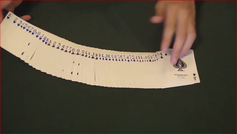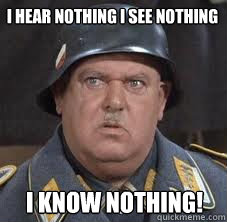
The Lessons in recent weeks often remind me that “time” is only a construct we thought up when we made this world, this universe, this dream. The Course tell us it's an idea. Nothing more.
I have believed in time most of my life in the same way almost everyone does. I believed time, as in the old cliché, is like a river. I believed that:
Here's a mental image that works for me. I'll explain it twice.
Quick and Simple Version
Imagine someone spreads a deck of cards out on a table. The table represents all of Creation. The cards represent time.
But then, someone comes along and slides all the cards back into a deck and takes it off the table. That's the end of time. The table didn't change at all.
The Deeper Version
Here's the same metaphor with more detail and more to think about.
Imagine a flat table that has no boundaries. The tabletop extends in every direction without limit. The tabletop represents the infinite thoughts of God and His endless Creation. Like God, the tabletop exists far beyond even what the word “infinite” could possibly suggest. It simply IS forever and forever.
Now, recall that momentary “tiny, mad idea” God's ever-so-powerful Sonship brought to mind for an instant. That idea made this place we call the world. Making this world and this universe also made space and time. So, in your mind's eye, see a magician spreading a deck of cards on the infinite tabletop as in the video below.
I have believed in time most of my life in the same way almost everyone does. I believed time, as in the old cliché, is like a river. I believed that:
- Time passes from the present moment into the past, continuously.
- Each future moment flows into the present, continuously.
- Eternity is the massive span of time that began in the ancient, unknowable past and will continue on infinitely into the future.
Here's a mental image that works for me. I'll explain it twice.
Quick and Simple Version
Imagine someone spreads a deck of cards out on a table. The table represents all of Creation. The cards represent time.
But then, someone comes along and slides all the cards back into a deck and takes it off the table. That's the end of time. The table didn't change at all.
The Deeper Version
Here's the same metaphor with more detail and more to think about.
Imagine a flat table that has no boundaries. The tabletop extends in every direction without limit. The tabletop represents the infinite thoughts of God and His endless Creation. Like God, the tabletop exists far beyond even what the word “infinite” could possibly suggest. It simply IS forever and forever.
Now, recall that momentary “tiny, mad idea” God's ever-so-powerful Sonship brought to mind for an instant. That idea made this place we call the world. Making this world and this universe also made space and time. So, in your mind's eye, see a magician spreading a deck of cards on the infinite tabletop as in the video below.
